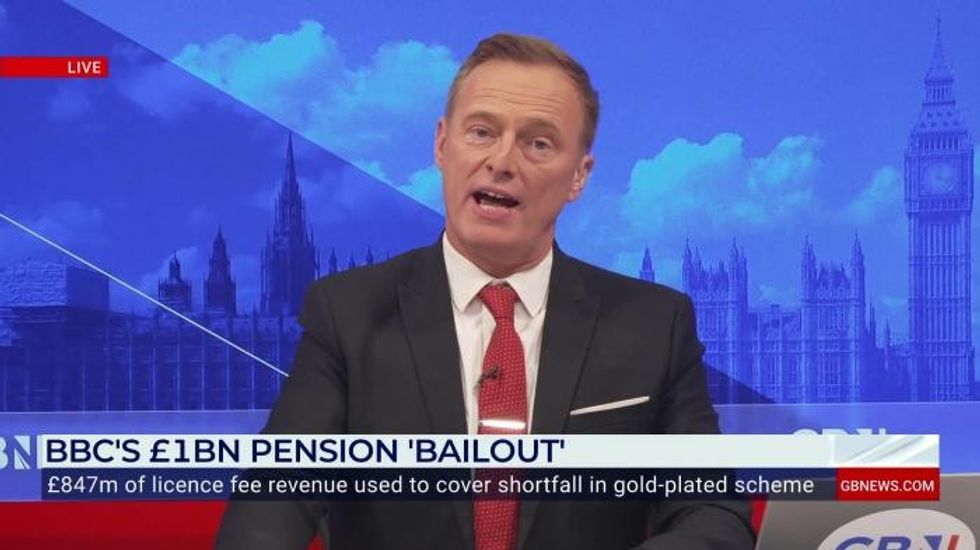The BBC has been criticised after plugging a “shortfall” in their pension scheme with licence fee-funded money.
Speaking to GB News, Elliot Keck of the Taxpayers’ Alliance declared that the “cats don’t get fatter” than the ones at the broadcaster.
A new analysis has revealed that the BBC has spent over £1billion on plugging a shortfall in its gold-plated pension scheme, costing the licence fee payer nearly £850million in licence fee revenue.
The shortfall comes amid financial pressure on the corporation, after it admitted that over 300,000 people had stopped paying the licence fee of £174.50 every year.
Discussing the bailout on GB News, Mr Keck explained: “This is the combined licence fees of about four million Brits, so four million Brits just to plug this shortfall. And essentially what you’re looking at here is the difference between what’s called a defined contribution pension scheme and a defined benefit pension scheme.
“The traditional pension scheme, you put a bit of cash in and your employer puts a bit of cash in when you retire, if it runs out, it runs out, you’re finished, no more pension for you.
“Defined benefit scheme looks at how long you’ve worked for an organisation and what your average earnings have been over that period, and then you get a guaranteed pension for the rest of your life when you retire. It doesn’t matter how much is in the pot, you’re guaranteed that money.”
He added: “What the BBC have found, essentially, is that they didn’t have enough money in their funds available to the people that had retired, and as a result, they’ve had to pump in £1billion more, and £850million of that has come from the licence fee payer.”
LATEST DEVELOPMENTS:
BBC licence fee: Tim Davie issues warning on evasion – ‘We are watching like a Hawk’BBC’s Tim Davie admits ‘MORE scandals could come out’ as he is brutally grilled by MPsBBC under fire for failing to disclose drug company payments to doctors in weight-loss jab debate
Criticising the BBC’s use of licence fee money, Mr Keck stated: “Licence fee payers are expecting high quality journalists, high quality dramas, high quality comedies, and we’re not getting that quality from the BBC. But these legacy fat cats have now changed their pension scheme.
“So they now use this defined contribution pension, which is based on actually how much money goes into your pension pot. But for the millions of people that pay for the BBC, for your viewers at home watching this, if they’re not happy with how their license fee payer money is being used, their only option is to obviously stop paying the license fee.”
He warned: “But of course, that means that if they watch any live television at any point, they risk a prosecution because that is illegal under British law to watch live television without paying the license fee.”
Weighing in on the bailout, host Martin Daubney said: “A lot of people are looking at this and thinking the numbers don’t add up. They seem to be stretched quite thin in their editorial remit, and it’s just a heck of a lot of money. £850million at a time when most people are struggling to pay their heating bills.”
Offering a solution to the BBC’s financial shortfall, Mr Keck responded: “The answer to this should be to firstly decriminalise payment of a licence fee, so that if people want to watch other television channels live, if they don’t want to watch the BBC, if they want to watch GB News, if they want to watch anything else live television but not the BBC, they shouldn’t be forced to pay for the BBC, forced to pay for spending that they may not approve of.
“And then ultimately, the BBC needs to be moved on to an entirely subscription fee based model, and then it will only be the people that actually want to consume the BBC want to fund the organisation that will end up paying for it.”
Predicting that the BBC is on “borrowed time”, Mr Keck concluded: “Whoever is in opposition should be making it absolutely clear the BBC are on borrowed time. Whoever gets into Government next, they’re going to scrap the licence fee. So it’s time for BBC bosses to start putting in place the plans that must already to some extent exist in the BBC. I refuse to believe that no one at the organisation has looked into how they would do a subscription model, but they need to clearly signal to bosses of the BBC that their time is up.”
In a statement, a BBC spokesman told GB News: “The BBC continues to review its pension arrangements and the interests of both staff and licence fee payers.
“Like many organisations, we were required by regulation to recover from funding shortfalls and a defined budgets pension scheme which were caused by external factors. However, we remain committed to providing a pension offer that is financially sustainable while also being fairer and more consistent for all employees.”
Our Standards:
The GB News Editorial Charter
